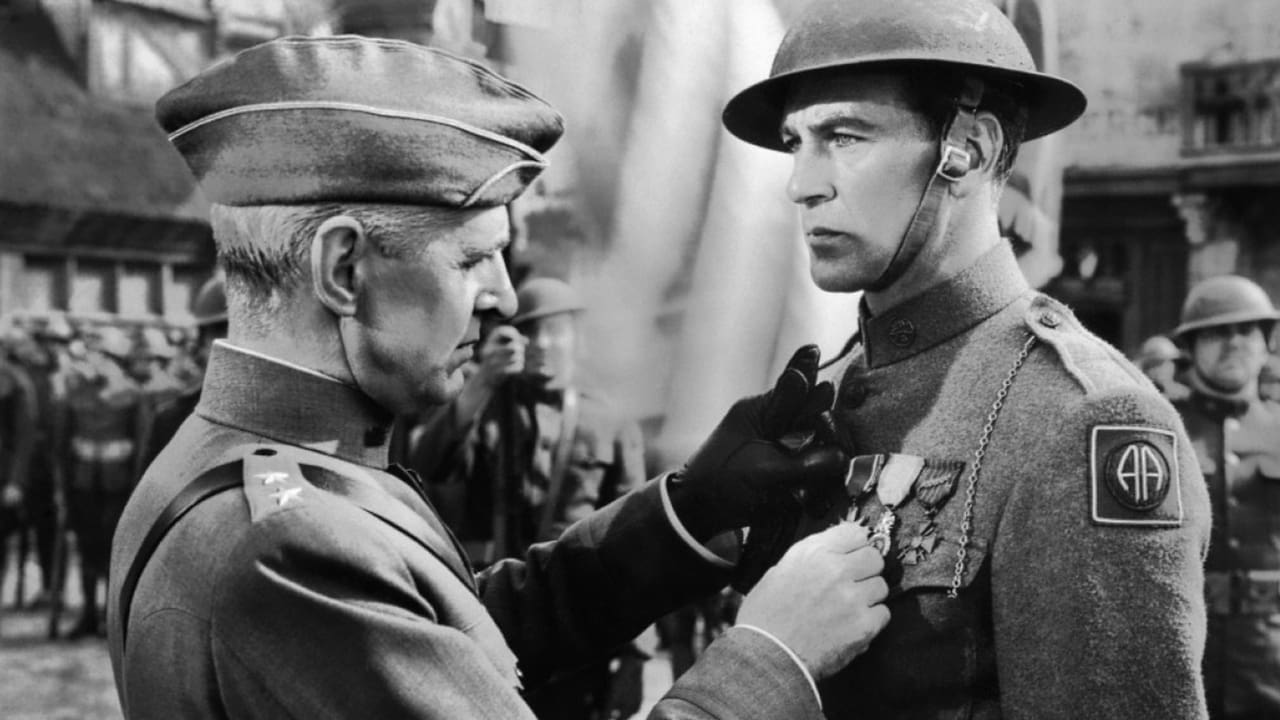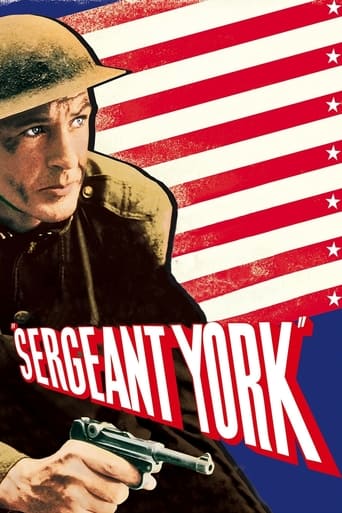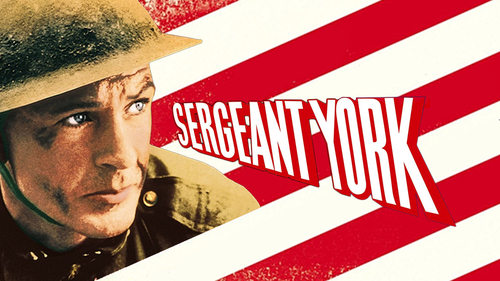



Really Surprised!
Just perfect...
At first rather annoying in its heavy emphasis on reenactments, this movie ultimately proves fascinating, simply because the complicated, highly dramatic tale it tells still almost defies belief.
View MoreClose shines in drama with strong language, adult themes.
View MoreThis has been my favorite film since I was 12 years old in 1989. I'm not the type of person who has heroes but if I did Alvin York probably would be it. York the person, not the WWI hero he's been portrayed as. He wouldn't allow a film to be made about him because he didn't want to glorify violence especially of war and the death it entailed. He felt sorrow for the men he killed during the war his entire life.Obviously this film is propaganda; the fact York would only allow Gary Cooper to play him is probably one of the main reasons it wasn't made until 1940. Film execs tried for many years before then but York kept saying 'no'. The average difference of the two during WWI is huge. York was 28 and Cooper was 39 to 40 when making the film. Then you have Joan Leslie, really good in her part but she was 15 years old when this film was made. Kind of uncomfortable watching a 40 year old making out with a 15 year old but it is just acting, I guess. Joan Leslie was great in her role, I really can't imagine anyone else playing Grace.This film sort of portrayed York as an atheist who turned Christian. Never happened. He was always a Christian. The only change was that he became a pacifist Christian like his mother. As an atheist myself (for 28 years) I find that not only insulting atheists but also York himself. That's part of the propaganda that is this film. It was made for the looming war about to happen whether that year or the next. The film also made it seem as if York solely captured 132 Germans when in fact that's slightly untrue. He had help. Two of which didn't receive awards for their actions until decades later. One, not until the mid 1960s. There's a lot of fiction in this film which is why I never get my history from film; almost every film dealing with history always fictionalizes for some type of benefit. Which is sad, really. Unlike other propaganda films of the time this one has good production value, strong cast, great script, etc., if one who has seen the film knows about the actual York then one would know even his "biography/diary" was fictionalized but on York's end it had a good purpose rather thsn a deceitful one: he was trying to bring education to Tennessee people like him who had little to no education at all.Now while I like this film because of York, what he did, etc., he's not my favorite in this film. George Tobias as 'Pusher' is my favorite in this film. I've never seen a film Tobias was in that I didn't like and his character in this was great. A lot of things wrong with this film but a lot of things right with it which, ironically, makes it quite perfect. To know the true story of this film, as stated above: don't read his diary, unless you can find the original diary because otherwise his life outside this film is somewhat fictional, for good reasons, though. Even a lot of the speeches he gave in real life were written by other people, professional writers, for him to say. One can tell by how grammatically correct they are. York was borderline illiterate, he spoke and wrote how he thought; he was only in school for less than a year as a child. His childhood was the epitome of poverty. Children back then didn't go to school, they worked the fields. York was a violent alcoholic, that is true but he attended church regularly. He was never an atheist, as stated. It's a great film but mainly fiction.
View MoreOf course behind the blatant war propaganda and shameless just-converted preacher's talk, in the end, what the producers wanted was making money. Hence the hodge-podge of other things they throw into their concoction: romance, a strong-minded matriarch (but not even close to Ma Joad from "The Grapes of Wrath") rivalry, et al - which made them end up with a movie which might as well have been two or three different ones (talk about bad editing!)and, as I mentioned on the title, it ends up not achieving one of them skillfully enough to be taken seriously. After all, I dare even the most hard-core fan/advocate of this movie not to admit even they were wondering by the end of its second third, whether they were watching the right movie or not or when the war bit was actually going to start and how! The question "When is the sergeant finally taking over?" was constantly at the back of my mind by then.To mention a few flaws, and as much as I am a huge fan of, say Screwball comedy and the odd romance threw in, and still a great admirer of Hawks's, I fail to understand how on earth it could amass so many academy awards in spite of the gigantic competition that year (Citizen Kane et al).Maybe Gary Cooper, as usual, deserved his statuette in the end, as the truly convincing redneck simpleton who always goes about life with a naive look on his face (Mr. Deeds, anyone?). Also (and this is still the huge Howard Hawks fan speaking) the director/writers were just trying to be faithful to the book. As I can't vouch for it simply because I didn't read it, I'll have to quote someone else's review when they say this was a blatant case of an autobiography in which the author seemed to give more emphasis to promoting his deeds and achievements than actually worrying about whether his book would be a pleasant read or not. I very much doubt that Rambo-like scene actually happened that way! As far as my weak war tactics knowledge go, they threw it all through the window in that particular scene!But the film editing award!? Come on! Does the war effort really put people so out of their minds!? Do they suddenly start awarding people for simply saying what they want the population to hear and ignoring the great minds who don't comply to all that brain washing!?Finally, making war look like a turkey shooting (and fun!) wasn't IMHO a wise move. After watching this faux-pas I'm in desperate need of watching more sober films such as "Citizen Kane"; "All Quiet in The Western Front" for what a real WWI movie should look like, or even Hawks's sublime Screwball masterpiece "Bringing Up Baby" for laughs only, not an all-in- one concoction of a movie! PS: For Christ's sake, sharpshooters are meant to do just that in the trenches, not just chatting about between ducking here and there!
View MoreHoward Hawks directed Gary Cooper(in an Academy Award winning best actor performance) as Alvin C. York, a Tennessee man who starts off as a drunken hell raiser who is a source of embarrassment to his mother, who still steadfastly stands by him. He turns his life around when, after an accident in a thunderstorm, he sees the light, and converts to his grateful pastor(played by Walter Brennan) becoming a fervent follower, which means a pacifist. He also buys some bottom land, and marries the girl he loves, named Gracie. When WWI breaks out, York is drafted into the army, and does a great deal of soul-searching before deciding to go, and ends up becoming the most decorated soldier of the war, singlehandedly capturing a group of German soldiers by using the same technique applied to winning Turkey shoots! Excellent direction and performances, good script combine to make a memorable film, that is all true, even if it does seem incredible.
View MoreThere are movies that you can barely remember hours after watching them, and there are movies you can't forget even years later. Sergeant York is the later. The movie remains etched in my mind and heart.It is a story clearly told, yet not oversimplified, with characters boldly drawn, yet not caricatured, at least not the main ones. It would be a great story even if it were not true, but it is true, at least in the main. York's conversion by a lightning bolt striking his rifle is fiction, though his heavy drinking, fighting and ultimate conversion are not. So the lightning is cinematic device to shorten the process, and a brilliant one.Those who talk about it as a war story (and who complain the first part is boring) miss why this film is so great. It is also a love story and a story of family. Joan Leslie is heartbreakingly sweet and lovely as Gracie Williams. We can feel the chemistry, and see that she is a force for good in Alvin's life, who was 30 when he was drafted.Leslie's portrayal of Gracie is so full of life and youth and charm. Compare that with Margaret Wycherly's portrayal of Mother York, who is old, tired, dessicated of emotion. Yet she is full of wisdom, of understanding Alvin's passion for Gracie. In her eyes, you can see her thinking back to when she was once Gracie, in her long ago youth. It is a silent, motionless look, plumbing the depths of memory -- a master actress's use of silence.I think most viewers take Wycherly's performance for granted, perhaps assuming we are seeing the real Wycherly. Yet she was born in London in 1881 to a father who was a doctor -- far from the poverty of Pall Mall, Tennessee -- and had been mainly a British stage and film actress. Nevertheless, those who knew the real Mother York say Wycherly's portrayal was spot on. Now that is real acting.It is curious that this is the role that earned Gary Cooper his first Oscar. We, the modern viewer, have seen that Aw Shucks persona many times. But apparently it fit the real Alvin York, who insisted on Cooper playing him on screen, and was present for the movie's premiere. You can read about Alvin York online, on Wikipedia and on Gutenberg.org, which has a 1920s biography online. In the quotes of the actual Alvin York, you can easily hear Gary Cooper's voice.Henry Fonda was considered for the role, and matched York's looks more closely. But he was only a few years younger than Cooper, so it wouldn't have helped much with the Gracie-York match up. I think he could have done the role, but Cooper's fit was right and almost magical. Modesty was the hallmark of York, and Cooper had it down, far more than Fonda. Frankly, I don't notice the age thing when I watch it; it's a movie and you need to be prepared to suspend disbelief up to a point. Besides, people who work hard outside tend to look older, especially if they don't have much to eat.The scene where the family sits down to dinner and Mother York proudly presents the bag of salt is so beautiful. She reminds me of a stray mother cat who will do anything to protect and feed her children, even to the point of starvation or death, herself. And when I buy salt, I sometimes think about this, and how lucky I am.As to the portrayal of "hillbillies," we must remember that this was an extremely rural mountain area with no road coming in -- the real Alvin pushed the state to build one after the war -- and it was nearly a century ago. People were different. There was little schooling, too, and the real Alvin later raised funds to build a school. While we see Alvin drinking and fighting, we also see hard working, intelligent, gentle people with nice homes, so I don't see any stereotyping here.As to the war, yes, the story is true. You can read about it yourself. And it provides a great lesson we should continue to remember today and in the future: The only justification for killing people in war (aside from self defense) is to end the killing and end war. That is what was in York's mind, and he says so, to stop the killing. York was a pacifist at heart. Killing the enemy out of anger, hatred, retaliation or revenge was not in his mind, and should not be in the mind of any soldier. When this happens, it corrodes the soul of the soldier, so that he can no longer feel like a normal human being.It was also probably what was on the minds of thousands of Americans who enlisted after seeing this movie, which was released months before America actually entered the war following Pearl Harbor on Dec. 7, 1941. By then, the war had already been raging for two years, and America's entry was consistent with York's hope of helping to bring the fighting to an end.York didn't lose his feeling for his fellow man. I found this item from the IMDb trivia section interesting: "Alvin York himself was on the set for a few days during filming. When one of the crew members tactlessly asked him how many "Jerries" he had killed, York started sobbing so vehemently he threw up. The crew member was nearly fired, but the next day, York demanded that he keep his job."While the attack he lead killed 28 German soldiers, he also captured 132, saving their lives.
View More